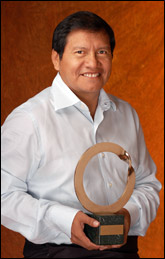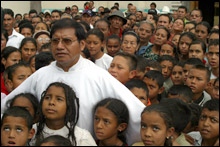
José Andrés Tamayo Cortez.
Photo: Goldman Environmental Prize.
The woodlands of southeastern Honduras range from mountaintop cloud forests to low-lying rainforests; they are home to more than 500 bird species and a wide array of other animals and plants. But in recent years, more than half of the 12 million acres of forest in the isolated Olancho region has been mowed down by unregulated logging. Rev. José Andrés Tamayo Cortez, a Catholic priest from Tegucigalpa, has witnessed the devastating effects of logging on the diverse Olancho landscape, and has seen its people intimidated, harassed, and even murdered by the crime bosses who control the area.
Tamayo, 47, directs the Environmental Movement of Olancho, a coalition of farmers and other Olancho residents dedicated to stopping the logging spree. He has led thousands of people on two weeklong marches to the nation’s capital, drawing national and international attention to the problems caused by unregulated logging, associated crime, and alleged corruption in the Honduran forestry agency. The second march, in June 2004, led to a government investigation of the forestry agency and the resignation of its general manager.
Tamayo was the recipient of the 2003 Honduras National Human Rights Award. In an April 18 ceremony in San Francisco, he was awarded one of six 2005 Goldman Environmental Prizes. He spoke with Grist through a translator.
Could you describe the forests of the Department of Olancho?
Once it was called Olancho Libre — Olancho Free Land. The entrance to it is still practically an entrance to paradise, a welcoming into the forest. But in the interior, it’s all destruction — it’s like they have killed its soul. There are a few places in the interior that remain as relics, as witnesses, to the fact that here there was something beautiful.
How has unregulated logging affected the people of eastern Honduras?
What we witness is an absence of water — because of the lowering of the water table — a loss of harvest, an emigration of the youth, and greater poverty. People’s clothes are tattered, they are malnourished, and they have no desire to be seen — you can see it in the faces of the subsistence farmers. We are also seeing a strong and worrisome increase in delinquency.
Was there a particular event or person that inspired you to speak out against illegal logging and related development?
Yes, there was. I was once in a place in the forest, enjoying the air, the sounds of the water, the freshness of the air — it was a beautiful landscape. Then, a week later, I returned to the same location, and this place had been destroyed. I became deeply saddened, and shed tears. I said, “God, what road, what path, can I take so that this situation doesn’t occur again in Olancho, or in this country?” At that moment, I felt compelled to start my efforts on behalf of the environment.
Have authorities in your church supported your efforts?
It has been a consciousness-raising effort. They see the problem, but they don’t experience or suffer the problem.
I understand you led two weeklong marches, each involving thousands of people, to protest illegal logging and government corruption. What has the effect of the protests been?

Tamayo with his parishioners in Salama, Olancho, Honduras.
Photo: Christian Lazen-Bernardt.
It has placed all of these various problems on the government’s discussion table. It has developed consciousness among the people — more than anything, they have come to realize that life has no value outside of nature. It has also drawn international attention to our efforts.
What we want is to unify people around the defense of the environment. We want to raise the awareness and understanding of the violence and abuses committed by the government and large corporations. We want to broaden our efforts to fight [international free-trade agreements such as] NAFTA [the North American Free Trade Agreement] and CAFTA [the Central American Free Trade Agreement]. What we have to do is bring people together to fight the invasion of this monster, and to protect the biological corridor of Mesoamerica.
I understand you have been harassed, threatened, and even assaulted because of your work. What gives you the strength to keep working?
My courage emerges from my own consciousness. Death threats don’t perplex me — I don’t waste my time thinking about death. I work in defense of life, for the fulfillment of the gospel, and I work to be faithful to God and the people.
How can people in other countries aid your efforts?
They can research what is going on, and make the destruction and corruption internationally known. They can put conditions on aid and loans to the government, and create a [timber] certification law. They can also raise awareness so that people cannot enjoy, say, furniture or other products when they know that this enjoyment, these benefits, are causing deprivation and misery among the Honduran people.

